 |
| Dar es Salaam Bus Rapid Transit (DART) |
Jobs in Tanzania 2020: New Jobs Vacancies at Dar es Salaam Bus Rapid Transit (DART) 2020
AJIRA TANZANIA 2020 / NAFASI ZA KAZI 2020
Overview
Dar
es Salaam bus rapid transit is a bus rapid transit system that began
operations on 10 May 2016 in Dar es Salaam, Tanzania.The transit system
consists of 6 phases and the construction of the first phase began in
April 2012 by the Austrian construction company Strabag International
GmbH. Construction of the first phase was completed in December 2015 at a
total cost of €134 million funded by the African Development Bank,
World Bank and the Government of Tanzania.
Recommended:
Download Your National ID (NIDA) Here | Download NAMBA NA KITAMBULISHO CHAKO CHA NIDA. BONYEZA HAPA!
The
first phase of the project has a total length of 21.1 kilometers with
dedicated bus lanes on three trunk routes with a total of 29
stations.The entire system is operated by The Usafiri salama Dar es
Salaam Rapid Transit (UDA-RT) under the surveillance of the Surface and
Marine Transport regulatory authority (Sumatra) Currently, the route is
serviced by a fleet of 140 Chinese built Golden Dragon buses, providing
express and local service for 18 hours daily from 05:00am to 11:00pm.
Read Also:
History
With
the rapidly growing population of the city, the government began to
draw plans for a rapid transit system in 2003. The government predicted
the city population to grow over 5 million by 2015 and invited the Japan
International Cooperation Agency to design a master plan for transport
in the city in June 2008.
Recommended:
A
bus rapid transit and a metro transit system were proposed but the
metro system was not approved due to the high construction and
operational cost involved. The project was placed under the Prime
Minister's office and a Dar Rapid Transit Agency (DART) was created
through a government notice on 25 May 2007. A 130 km bus rapid transit
was planned to cover over 90% of the city's population and the project
was split into six phases due to the large investment required.
Recommended:
The
initial project cost was financed by the world bank and the bank
provided $180 million for the construction of the first phase.
CLICK LINK HAPA CHINI KU- DOWNLOAD PDF File to read full job details and mode of application in PDF file below:
DOWNLOAD PDF FILE HERE!
DOWNLOAD PDF FILE HERE!





No comments:
Post a Comment